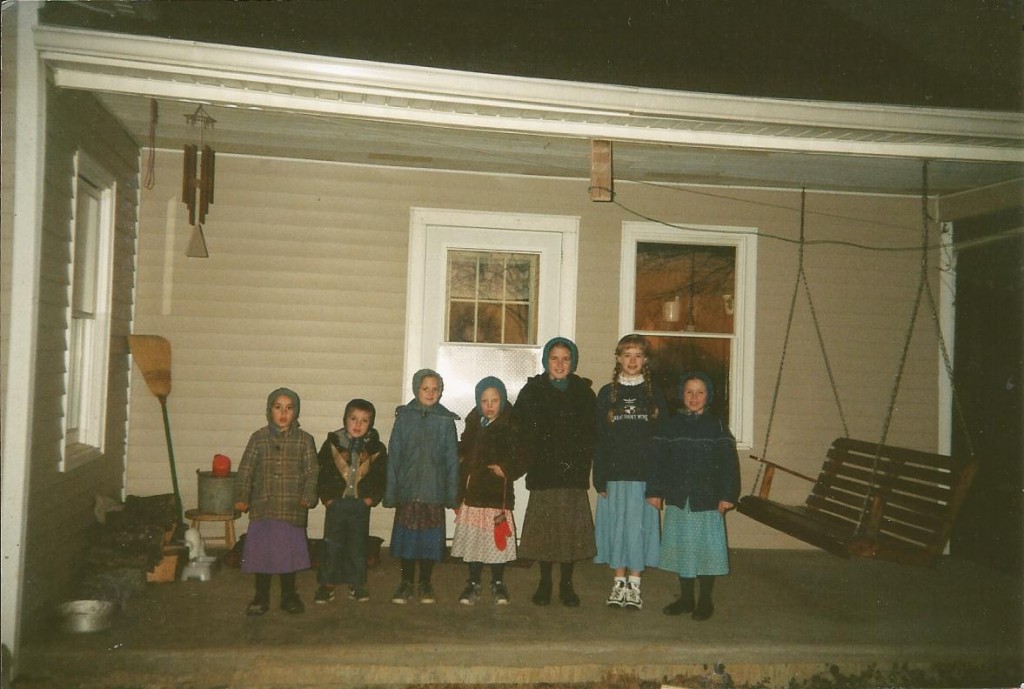My Plain People
Today I was working on answers regarding a radio interview that will be aired this summer after my debut novel, The Outcast’s release.
• What is your connection to the Amish? Or to Plain People?
• When did your interest in the Amish get started?
The questions were simple and welcomed, yet they baffled me. It was like trying to answer when I realized my parents were my parents. Or when I became interested in being a girl. I don’t have connections to the Plain People.
The Plain People are my people.
As a child, we visited my great aunties in Lancaster, Pennsylvania, who had never married and lived in a gray stone house back a long gravel lane. They wore kapps and offered us koppche cheese and crisp, seven-day pickles in crystal relish bowls. In their soft voices, I heard traces of their Pennsylvania Dutch accent that was my heritage.
I never met my father’s mother—my grandmother, Ada Good Miller—as my mother was still pregnant with me when my grandmother died. But I still loved looking at her wedding portrait, which was allowed because they were New Order Mennonite. Grandmother Ada was both beautiful and sturdy, with warm, well-dark eyes and thick molasses hair concealed beneath a kapp; her rather large fingers holding tight to my smaller grandfather’s hand.
My mother even used Pennsylvania Dutch words like strubbly if my hair looked unkept; ferhoodled if something was confusing; Ach, du lieber when she was exasperated, even though it actually meant “Oh, my dear.”
When I was ill, she made chicken rivel soup (or hinkel rivvel suppe) from a recipe in the Miller’s Mennonite Community Cookbook. She rubbed my feet, seeking out the pressure points that her mother had learned later in life: a holistic occupation that helped sustain her eleven-member family.
My father built our house with his own two hands and used those same two hands (calloused from construction work that began when he was seventeen: the zenith of Lancaster County’s bittersweet expansion) to build his storage business barn business from the ground up.
I did not know any of these things were unusual – the food, the language, the capabilities that were just part of Plain life – and I actually took our simple life for granted. Sometimes I resented it, snootily wanting name-brand clothes or a house that wasn’t built from painted T1-11 siding.
But last weekend, my heart ached for the childhood that I had lived. I was at Scottsville, Kentucky’s annual farm machinery auction where we were filming The Outcast’s book trailer. Two young boys with matching suspenders sat in a boat moored next to the auctioneer’s booth. A tangle of purple martin bird houses was stowed on the bottom of the boat, like a strange catch of the day.
I saw identical twin toddler girls, wearing pastel cape dresses and sun bonnets, perched on opposite sides of a Red Rider Wagon. My throat caught, as I imagined these were The Outcast’s fictional characters – Rachel and Leah – brought to life.
“Your daughters are beautiful,” I murmured to the mother, who was pulling the wagon.
She looked up beneath her black bonnet – her blue eyes meeting mine – and then turned away. To her, I was just an intrusive young woman wearing salt water pearls and lipstick at an auction. She could not see my Plain heritage hidden beneath my Englischer clothes.
We finished filming in the afternoon. Tired and hot, we were toting the equipment back to my car when I saw a group of Old Order Mennonite girls coming our way. I stood stock-still on the dirt lane. A truck passed with Golden Red chickens clucking in the back. Dust accumulated like a ghost.
Once the swirl cleared, I continued walking and squinted against the sun.
“*Rebecca?” I called. I was sure it was her. She’d grown taller in the decade since we played together. Her curled brown pigtails were kapped and she wore black tights and lace-up shoes where we used to run through the strawflower field in bare feet. But when she stopped talking and looked up, her smile was the same.
Encouraged, I moved quickly and wrapped my arms around her before I had time to think what I was doing and she had time to step back. She stiffened in my embrace and said, “How do I know you?”
“It’s Jolina,” I said. “We used to play together on your farm.”
“It’s not!” she cried.
Laughing, I pushed up the floppy brim of my hat so she could see my face. “It’s been like, what, ten years?”
She nodded, then looked down at her feet. The girls flanking her side had stopped chattering in Pennsylvania Dutch. But they did not move away.
“I was sorry to hear about your father,” I said. “He was a good man.”
She smiled sadly. “Yes, he was.”
Our friends – Englischer and Plain – continued waiting politely, but we both knew it was time to go.
I gazed at beautiful, grownup Rebecca and said goodbye. Yet even while eating our picnic lunch on the hill joining two Plain homes with immaculate flower gardens and slightly disheveled barns, I kept looking down that lane, wondering if my old friend would cross my path again.
For in the end, I found we were not walking too far apart.

The only picture from the years I spent with my Old Order Mennonite friends. Whenever we visited, I braided my hair and wore a jean skirt so as not to offend. *Rebecca”s name has been changed to protect her identity.
What is your heritage? Did you always appreciate it, or did that appreciation also take time?
Sorry, the comment form is closed at this time.



Annie Neugebauer (@AnnieNeugebauer)
What a lovely story. I have to say, as an outsider who’s not especially familiar with the Amish culture, “the plain people” is a fascinating term. It seems like it could almost be unfavorable, but clearly it isn’t. Great photo, too!
jolina
Glad you enjoyed it, Annie. I have to say that there’s a darker side to Plain life, as there is to everything else. I hope to convey both through The Outcast, as I wanted a realistic perception of the fallibility of man.
Melissa Crytzer Fry
Oh, Jolina… This makes me want to read The Outcast even MORE than before (if that’s even possible). Your descriptions of things that were simply part of your world (koppche cheese and crisp, seven-day pickles in crystal relish bowls) – and the language that simply “was” (strubbly, ferhoodled …. LOVE) is fascinating! I think I may be even more interested because I grew up right next to several large Amish families, yet knew NOTHING of their culture. How I wish I been more inquisitive or somehow more connected! I simply saw them driving tractors down the road (their substitution for cars), smiling and waving happily. You’re providing your readers with such a GIFT … to experience your heritage through your lovely, beautiful, poetic words. And I was SO excited that it truly was Rebecca… that you recognized her…that you still have those memories. And LOVE the photo of you in your jean skirt.
Melissa Crytzer Fry
And… When will the trailer be ready? I’m SO excited to see it! Can we pre-order the book, too?
jolina
Oh, yes! That jean skirt! AND sneakers! What a combination! ; ) So glad you enjoyed this sneak peek into Plain life. I cannot believe I saw “Rebecca” after all that time. I actually saw her sister, too. Unbelievable. The book trailer should be finished soon, especially by the end of the month. I can’t wait to share it. I think it’s going to be artistic and FUN!
Cynthia Robertson
See, this: “A tangle of purple martin bird houses was stowed on the bottom of the boat, like a strange catch of the day.” is EXACTLY why I so look forward to reading your book!
What a lovely tale, Jolina. It’s wonderful you ran across your old friend.
jolina
You’re so kind, Cynthia. Thank you for those words! Can’t wait to read yours as well! : )
Katherine Scott Jones
What a lovely glimpse of tiny piece of the story behind the story. No wonder you were able to write The Outcast so compellingly. And yes, you will let us know when the trailer is ready–right?
Mtmama
Jolina, just talked to ‘Mom’. I’m so happy for you that things are coming together for you and this book! I foresee a great book-writing future for you. Can’t wait to read it and see the book trailer!
jolina
Hey, Aunt Lyd! Thank you so much for helping us with the pronunciation list! You saved us… : )
jolina
Hey, Katherine! Thank you…I’m glad you enjoyed it. : ) I will definitely let you know when the trailer’s ready! Xx
Pingback: Q&A with Jolina Petersheim, author of THE OUTCAST